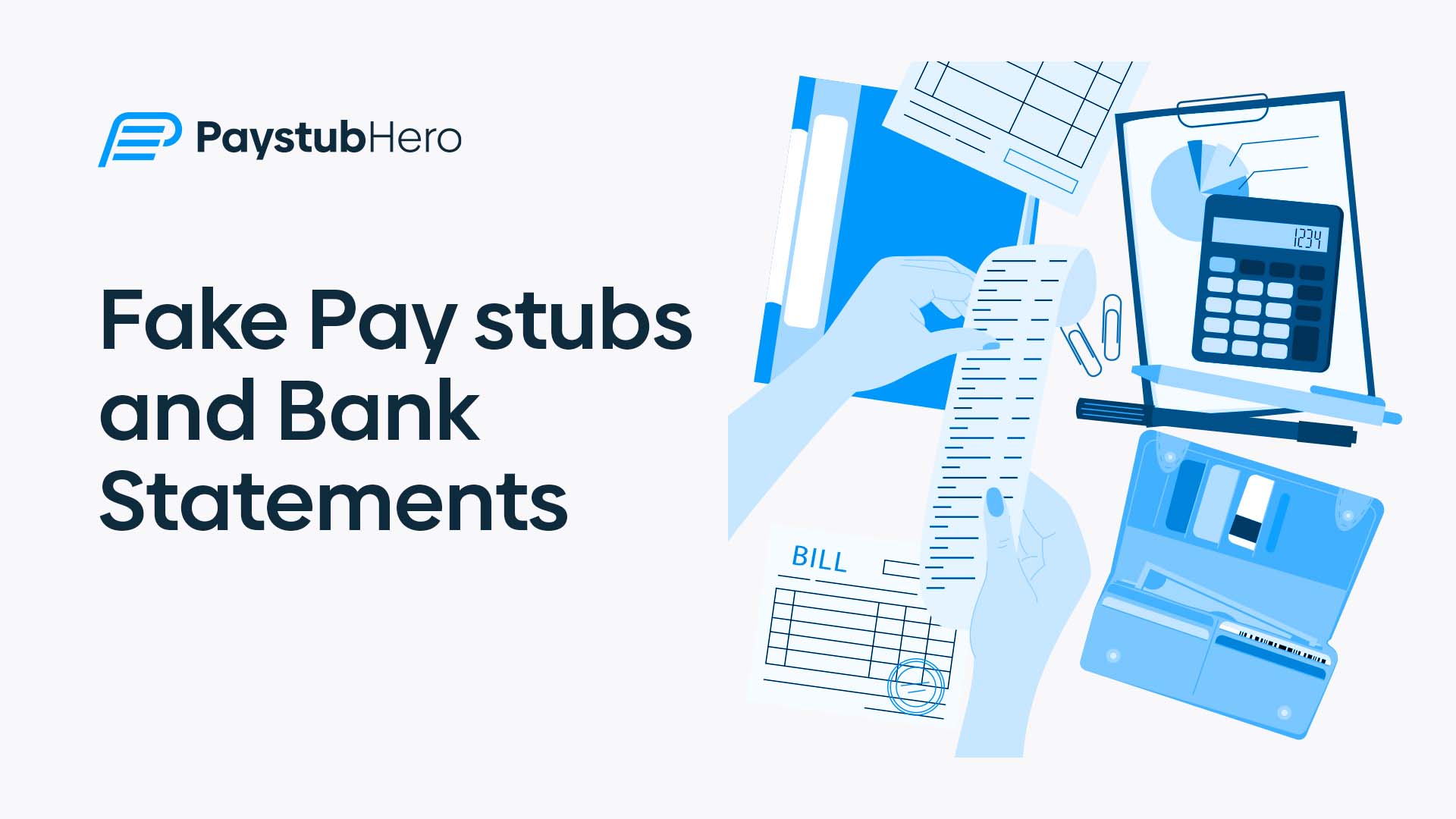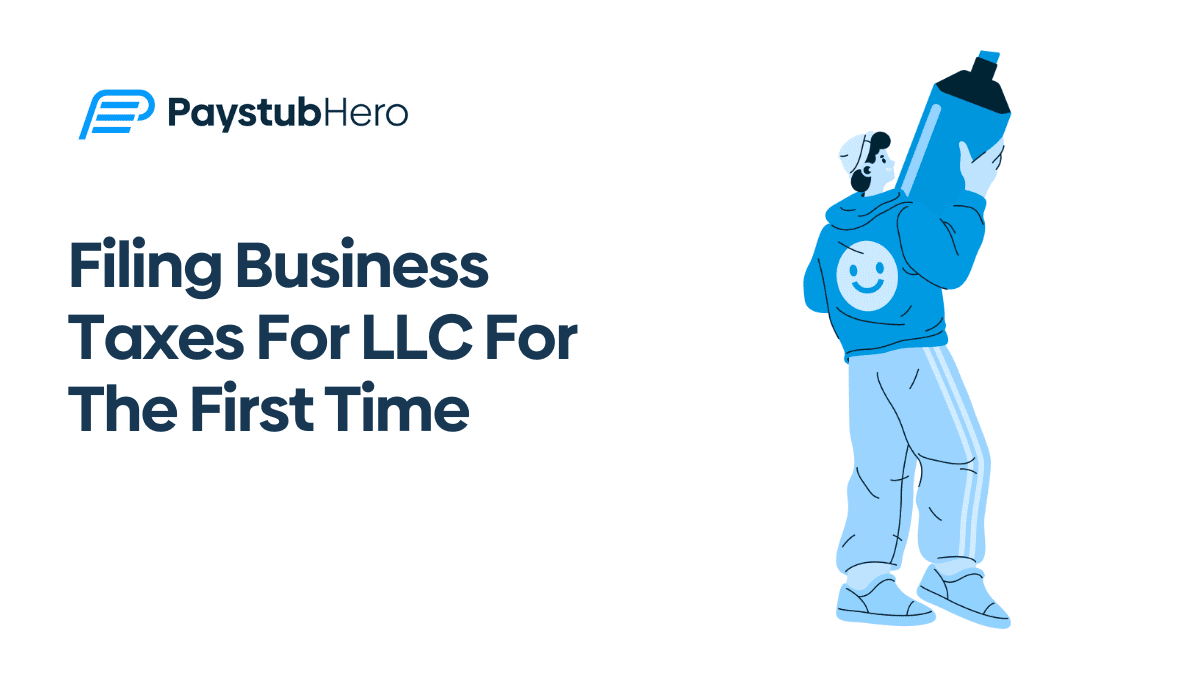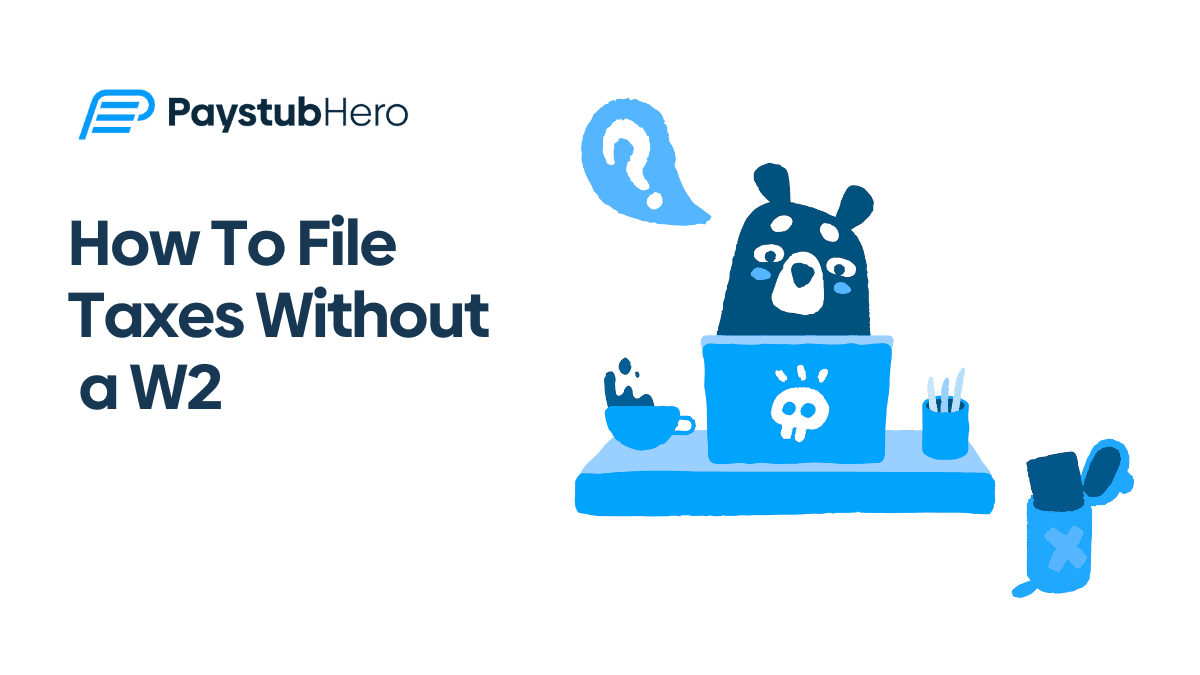Should I create fake pay stubs and bank statements?” This question typically arises from situations that demand proof of income or financial stability, such as securing a loan, renting an apartment, or demonstrating fiscal responsibility.
The straightforward and unequivocal answer to this question is: No, you should never create fake pay stubs or bank statements. The reasons behind this emphatic rejection are manifold, encompassing ethical, legal, and financial considerations with immediate and long-term implications.
Regardless of the appealing quick-fix, these counterfeit documents may seem to offer, the ramifications are just too severe and far-reaching, making the gamble simply not worth the risk.
At first glance, the prospect of whipping up fake pay stubs or bank statements may seem harmless, especially when faced with a desperate situation. The reality, however, paints a starkly different picture.
Every financial decision we make, no matter how trivial it might seem, leaves a footprint, shaping our financial reputation and credibility. Delving into fraudulent practices such as creating fake financial documents can leave a footprint so deep and destructive it may take years, if not decades, to erase.
Now, let’s delve deeper into the reasons why creating fake pay stubs and bank statements is not only a bad idea but it’s also a dangerous path to tread.
Table of Contents
- Introduction: The Problem with Fake Pay Stubs and Bank Statements
- The Allure and Consequences of Fake Documents
- Real-Life Examples: The Rise and Fall Through Fake Pay Stubs and Bank Statements
- Actionable Steps to Avoid the Trap of Fake Documents
- The Solution: Legitimate Pay Stub Generation
- Conclusion: Choosing Authenticity Over Deception in the Landscape of Financial Documentation
The Allure of Fake Documents and the Ensuing Consequences: A Double-Edged Sword
In our fast-paced world, the allure of quick-fix solutions can often overshadow the potential consequences.
The same holds for counterfeit financial documents. In the face of pressing issues, such as acquiring a loan or renting a property, some individuals and businesses find themselves drawn to services offering fake pay stubs and bank statements.
These services, like paycheck stubbz, may present an appealing proposition for an immediate resolution, but the reality of this decision is far more complex and perilous.
On the surface, these forged documents appear to solve a pressing problem with minimal effort. It may seem as though they simply showcase a financial stability that could convince a potential landlord, appease a bank, or convince a creditor. However, the repercussions of using these documents extend far beyond the immediate situation.
At its core, fabricating fake pay stubs or bank statements is a fraudulent act. A fraud of this nature can result in severe legal repercussions that vary from case to case but typically involve hefty fines, irreparable credit score damage, and in extreme situations, imprisonment.
The aftermath of such a decision can create a long-lasting, negative impact on one’s personal and financial life that far outweighs any temporary benefit that might have been gained.
Moreover, it’s important to remember that companies providing these counterfeit document services are operating on the fringes of legality, if not outright illegally. Their continued existence is in doubt, especially as authorities intensify their crackdown on such operations.
Engaging with these entities adds an additional layer of risk to an already dangerous endeavor. The potential for these companies to vanish overnight, leaving their clients stranded and exposed, is a constant, real threat.
Therefore, when it comes to considering the use of fake pay stubs and bank statements, the adage rings true: If it seems too good to be true, it probably is.
These documents might provide a short-term illusion of solvency, but the longer-term realities of legal repercussions, shattered credibility, and financial fallout tell a very different story.
Real-Life Examples: The Rise and Fall Through Fake Pay Stubs and Bank Statements
As we delve deeper into the real-life implications of counterfeit financial documents, the evidence underscores the troubling prevalence of this issue.
Across different sectors, from rental markets to banking institutions, the rising tide of fake pay stubs and bank statements has caused both businesses and individuals to adapt and respond, often to their detriment.
In the rental market, for instance, a worrying trend has taken root. Landlords and property managers, often unsuspecting victims of this ploy, report an uptick in prospective tenants providing fake pay stubs as proof of income.
These false documents create a facade of financial stability, enticing landlords into rental agreements with tenants who may not have the means to meet their contractual obligations. Such situations often culminate in eviction proceedings, a stressful and time-consuming process.
For the individuals involved, the consequences are often severe, including legal action, financial losses, and significant damage to their credit and rental history.
Similarly, banks and loan companies are not immune to this phenomenon. These institutions, central to our financial ecosystem, have seen a surge in loan applications supported by counterfeit bank statements.
Such attempts at deception force these institutions to continually refine and tighten their verification processes, leading to a more rigorous scrutiny of all applicants. This means, even honest, law-abiding customers may find themselves facing increased red tape and potentially invasive financial checks.
Moreover, it’s essential to remember that the fallout from the use of fake documents doesn’t stop at legal repercussions.
The stigma attached to fraudulent practices can be lasting and pervasive, affecting relationships with future landlords, banks, and even employers. Those caught in this web of deceit face not only the immediate penalties but also a future marred by suspicion and mistrust.
When we examine these real-life scenarios, the warning is clear: the quick-fix appeal of fake pay stubs and bank statements can lead to a slippery slope of complications, legal issues, and tarnished reputations.
The risk is simply too great, and the stakes are high, especially when the truth inevitably comes to light.
Real-Life Examples: The Damaging Reality of Using Fake Pay Stubs and Bank Statements
When we turn our attention to real-world scenarios, we get a clearer understanding of the widespread impact of the misuse of fake pay stubs and bank statements. The stark reality of this situation unveils a grim pattern of both personal and societal consequences that cut across different facets of the economic landscape.
Take the rental market as an example. There’s a rising trend of prospective tenants presenting fake pay stubs as evidence of financial stability.
Landlords, often caught in the crosshairs of this deceptive practice, find themselves having to deal with tenants who may not have the capacity to consistently meet their rent obligations.
This problematic situation often escalates to eviction proceedings, which are not only time-consuming and stressful but also result in legal implications.
For the tenants who chose this fraudulent route, the legal action, subsequent financial penalties, and long-lasting blemishes on their credit and rental history create an obstacle-ridden path that’s hard to overcome.
On a broader scale, banking institutions and loan companies have also been grappling with this issue.
As critical players in the financial ecosystem, they have seen a notable surge in loan applications backed by falsified bank statements. Such deceptive practices have forced these institutions to constantly adapt and tighten their verification procedures, making the loan application process more rigorous and demanding for everyone involved.
Even for those who have always adhered to the rules, these increased verification measures could mean facing more hoops to jump through, which can be both invasive and time-consuming.
Beyond the obvious legal consequences, the use of counterfeit financial documents can also cast a long shadow on one’s personal and professional life.
The stigma attached to fraudulent practices can be incredibly hard to shake off and can influence future relationships with landlords, banks, employers, and even personal connections.
Being caught in the act can lead not just to immediate punitive measures, but also to a future painted with mistrust and suspicion.
When examining these real-life examples, the message is loud and clear: Using fake pay stubs and bank statements as a temporary solution can lead to an avalanche of problems.
It’s a path fraught with risks, potential legal issues, and long-lasting impacts on one’s personal reputation and financial health. Despite the immediate appeal, the long-term reality of using these counterfeit documents is undeniably damaging and simply not worth the risk.
Actionable Steps to Sidestep the Trap of Fake Documents: Building a Credible Financial Future
The temptation to use fake financial documents can be strong, particularly in difficult circumstances.
However, there are concrete and practical steps that you can take to avoid falling into this trap. By consciously choosing to steer clear of this risky path, you can build a solid, credible financial foundation that will serve you well in the long run.
- Prioritize Authenticity: The cornerstone of financial credibility lies in the use of authentic documents. Real pay stubs and bank statements not only reflect the true state of your finances, but they also reinforce your trustworthiness. Make it a habit to meticulously maintain your financial records, and ensure your documents are always accurate and up-to-date.
- Embrace Transparency: If you’re an entrepreneur, freelancer, or small business owner with fluctuating income, don’t shy away from this fact. More and more organizations are recognizing and accommodating non-traditional income streams. Being upfront about your financial situation can help foster a relationship built on trust and openness, reducing the need to resort to counterfeit documents.
- Seek Professional Guidance: Navigating the world of finance can be complex and challenging. If you find yourself in a difficult situation, don’t hesitate to seek the advice of a financial advisor. These professionals can provide you with valuable guidance and strategies to effectively manage your finances. They can also help you explore alternatives to using fake documents, steering you towards a path that upholds both your legal and ethical obligations.
- Use Legitimate Financial Tools: There are a plethora of legitimate financial tools and platforms available today that can help you manage your finances and generate valid pay stubs. Using these tools can help you avoid the pitfalls associated with fake financial documents, and provide you with credible, legal proofs of income when needed.
- Foster Financial Literacy: Understanding your finances is crucial in making informed decisions. Familiarize yourself with financial basics and continually seek to expand your knowledge. This can empower you to make choices that not only meet your immediate needs but also secure your financial future.
- By following these actionable steps, you can sidestep the potential pitfalls of fake financial documents, and instead, pave the way towards a more secure and credible financial future. Remember, in the long run, honesty and integrity in financial dealings always pay off.
The Solution: Legitimate Pay Stub Generation – A Path Towards Financial Responsibility and Trust
In the modern world, where digital technology is rapidly transforming various facets of our lives, a solution for those needing credible financial documents lies within reach.
The key? Legitimate pay stub generation. This path empowers entrepreneurs, freelancers, small businesses, and independent contractors to demonstrate their income responsibly and legally, fostering an environment of trust and reliability.
Legitimate Pay Stub Generation: The What and the Why
A pay stub is a document that outlines an employee’s pay information, including gross income, deductions, and net pay. For traditionally employed individuals, this document is usually provided by the employer.
However, for those working outside the traditional employment framework – such as freelancers, independent contractors, and small business owners – generating a legitimate pay stub can be challenging. This is where legitimate pay stub generation services come in.
Legitimate pay stub generation is not just a solution; it’s an essential tool in today’s gig economy.
It empowers non-traditional workers to provide an authentic account of their earnings, establishing credibility and building trust with potential landlords, banks, and other relevant parties.
Harnessing the Power of Legitimate Pay Stub Generation
Unlike fraudulent services that offer fake bank statements or paycheck stubbz, legitimate pay stub generation services operate within the bounds of the law. They provide an authentic, straightforward, and simple way for non-traditional workers to document their income.
Here are a few reasons why such a service is a wise choice:
1. Legal Compliance: Utilizing a legitimate service ensures you’re complying with the law. It eliminates the risk of legal repercussions that come with using fake documents, giving you peace of mind.
2. Trust Building: Using real documents helps build trust with banks, landlords, and clients. It shows them that you’re reliable, responsible, and transparent about your finances.
3. Easy Accessibility: The process of generating pay stubs through a legitimate service is often quick, straightforward, and user-friendly. It saves time and allows you to focus more on your work and less on administrative tasks.
4. Future-Proofing: Maintaining accurate records of your income is important for your financial future. These records are essential for tax purposes, loan applications, or when you’re planning to rent or purchase property.
Choosing a path of legitimacy and trust in the realm of financial documentation not only resolves immediate needs but also fosters long-term success.
By leveraging legitimate pay stub generation, you’re taking a significant step toward responsible financial management and laying a strong foundation for your future financial endeavors.
Conclusion: Choosing Authenticity Over Deception in the Landscape of Financial Documentation
As we navigate the labyrinth of finance, it becomes evident that our decisions – big or small – can leave lasting footprints on our financial journey.
The question of creating or using fake pay stubs and bank statements is no exception to this rule.
As we’ve explored in this article, the immediate allure of these counterfeit documents is overshadowed by the multitude of potential consequences that can unfold, spanning legal ramifications, financial losses, and damaged reputations.
However, every challenge comes with a solution, and in this case, it’s the choice of authenticity.
By being transparent about your income, by seeking professional advice when needed, and by using legitimate financial tools, you can steer clear of the perils of counterfeit documents.
And for those who don’t typically have access to expensive payroll software like ADP or Gusto, a solution does exist.
Enter Paystubhero, an online payroll software designed specifically to cater to entrepreneurs, freelancers, small businesses, and independent contractors.
It simplifies the process of generating authentic pay stubs, turning what could be a daunting task into a user-friendly experience.
By simply entering your company and employee information, the software handles the calculations, providing you with a reliable and legitimate proof of income.
The takeaway from our discussion is quite simple: Opt for authenticity over quick fixes, transparency over deception, and legitimacy over fraudulence.
Remember, your financial credibility is a significant asset – protect it with the right choices. The journey may be challenging, but with tools like Paystubhero, you’re one step closer to building a trustworthy financial future.
Ready to take the first step towards financial authenticity? Visit Paystubhero today and explore how simple generating legitimate pay stubs can be.
As easy as 1-2-3, you’re on your way to building a more robust, transparent, and trustworthy financial profile. Say no to fake pay stubs and bank statements, and yes to Paystubhero – your ally in the quest for financial credibility.
Frequent Asked Questions
- Can banks detect fake pay stubs?
- Yes, banks often have sophisticated systems and processes in place to verify the authenticity of financial documents like pay stubs.
- Can you verify income with bank statements?
- Yes, bank statements can serve as proof of income as they show a record of deposits over time.
- Can a bank statement replace a pay stub?
- While a bank statement can show income, it lacks detailed information like deductions and taxes that a pay stub provides. So, it’s not an ideal replacement.
- How do lenders verify pay stubs?
- Lenders typically contact the employer directly or use a third-party verifier to ensure the accuracy of pay stubs.








